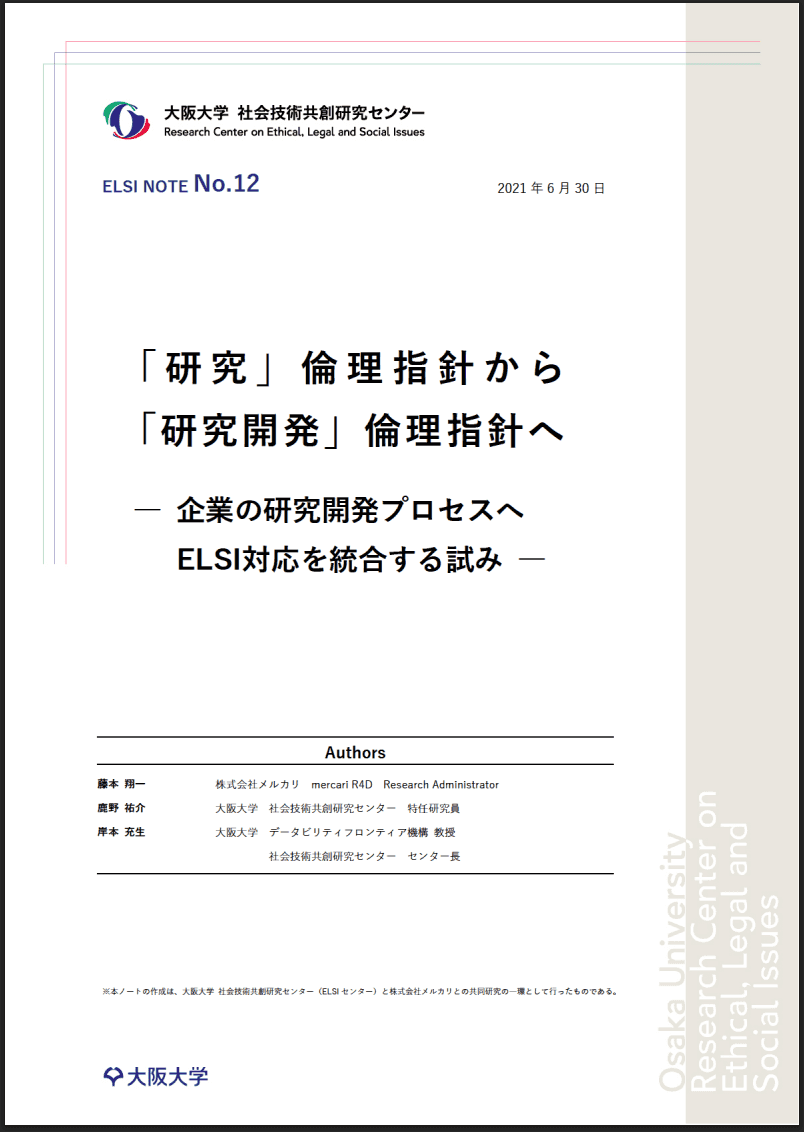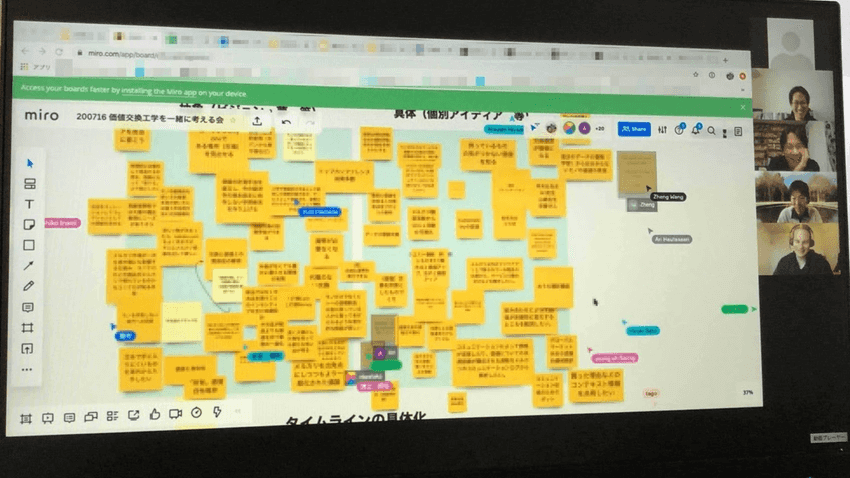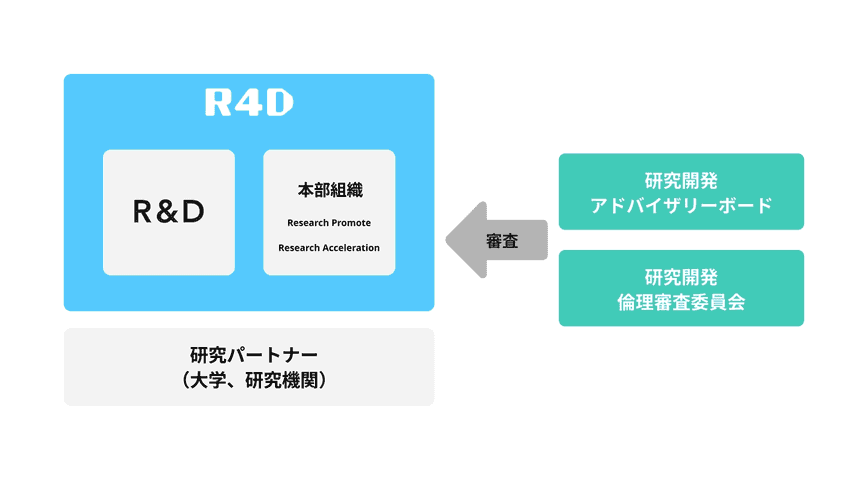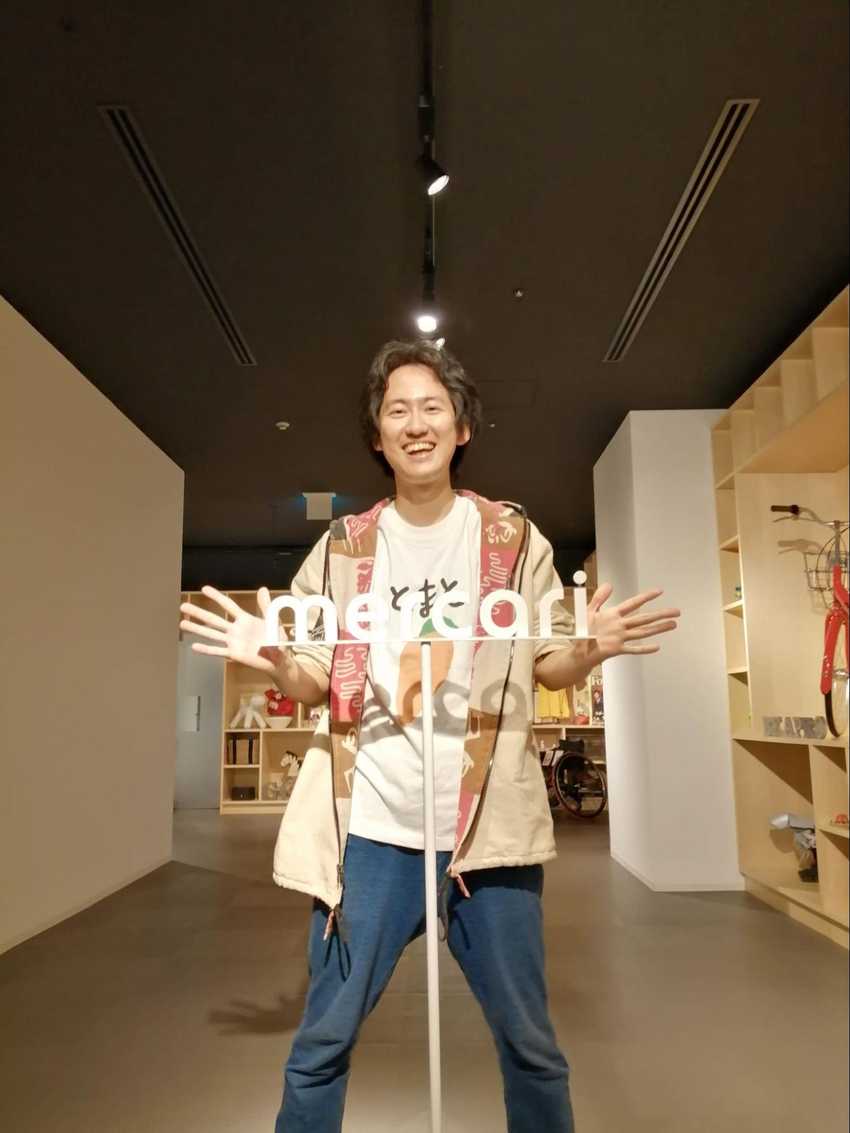Hi! This is Shoichi Fujimoto (@sho-1) from Mercari R4D’s Research Acceleration Team. I joined R4D as a research administrator in April of 2020, talking to both those who do and those who apply our research, and working on anything and everything that helps drive our R&D efforts.
In this article, I’d like to reflect on the work I’ve done as “the person who connects the research” over the near-five years that I’ve been here. I hope to document the behind-the-scenes of collaboration between industry and academia from the rarely told perspective of a private corporation.
To briefly introduce my career, before joining R4D, I entered the New Energy and Industrial Technology Development Organization (NEDO) as a new graduate, where I worked on tasks related to research and development project management and media coverage. My job was to drive research and development by connecting various stakeholders across the private, academic, and government sectors. One day, I came across Mercari’s R4D Research Administrator position, and upon hearing about their plans to establish a brand new research lab, I found myself unable to contain my excitement and took the position.
As a student, I chose a late specialization curriculum which allowed me to take a broad range of courses across the humanities and sciences until my senior year while I majored in science and technology studies and management of technology. I then went on to pursue a master’s degree, where I broadly explored approaches and methodologies to promote innovation toward solving the challenges that arise where science and technology meets society, from ethical, legal and social issues (ELSI) to responsible research and innovation (RRI) and more. Thinking back, I feel like the path I chose during my student years led me to my work as “the person who connects the research.”
It’s impossible to describe all of the various projects I took on while leveraging my background over the past five years in one article, so I will focus on three projects here: (1) the ELSI project, (2) Value Exchange Engineering, and (3) establishing and operating an advisory board for research and development.
1. The ELSI Project
ELSI, an acronym for ethical, legal, and social issues, refers to a research area that aims to identify the non-technical issues that may arise when researching, developing, and implementing new science and technology, and to propose solutions to those issues from diverse viewpoints. R4D in particular is taking on the challenge of implementing technology across a wide range of R&D fields throughout society. We have always believed that ELSI research, which means giving due consideration to social risk and impact, is an important foundational step towards the future of our R&D activities. In this project, we are working to link the concept of ELSI to practical application, not just within R4D, but also across all of Mercari Group.
- See the details here: https://r4d.mercari.com/en/elsi/
1.1. How it started
The ELSI project in collaboration with The University of Osaka Research Center on Ethical, Legal and Social Issues (ELSI Center) is the first joint research project between industry and academia that we established. Soon after I joined R4D, my manager at the time, @tago, told me that R4D had set up its system for research ethics reviews based on information published by universities and other institutions, but that we should revisit whether this is truly the best way to go about it and whether we can enhance our system. That’s how this project began.
I reached out to the director of the ELSI Center, Dr. Atsuo Kishimoto. (I’m referring to him as “Dr.” for the purposes of this article, but at the ELSI Center and in meetings we usually refer to him by name or by nickname.) During my time at NEDO, I worked with Dr. Kishimoto to review the safety of carbon nanotubes, and from there I also consulted him personally about ELSI-related research. Additionally, I happened to learn at an event called the ELSI Center Kick-Off Talk that the ELSI Center had just been established in 2020 and was looking to conduct joint research with private companies. It was the opportunity of a century. “The time is now,” I thought, and promptly reached out. That’s how R4D and the ELSI Center’s joint project on research ethics reviews began.
- Reference: Mercari and Osaka University ELSI Center Begin Joint Research (available in Japanese only)
1.2. Enhancing ethics reviews
To start, we decided to conduct a feasibility study (short-term and low-cost joint research), looking into enhancing R4D’s research ethics reviews. R4D’s research ethics guidelines had originally been created based on guidelines published by universities. However, universities’ research ethics guidelines were designed for medical research and included many points focusing on issues such as invasiveness (the physical effects of injections, surgery, etc.), which were not relevant to the scope of R4D’s research.
Thus, we decided to list up issues focusing on IT-related information management and privacy, as well as responsible research and innovation (RRI), the latest topic in science technology governance research, to create our very own Ethical R&D Guidelines customized to R4D’s needs. These guidelines were also unique in that we included not only research but also development in its scope.
We had a lot of fun and passionate discussions in the process of revising our guidelines. I still remember the days we spent putting our heads together with ethicists and philosophers to deliberate the meaning of specific portions of the text. Hoping to create a broad opportunity for the general public to discuss R&D ethics and also allow other companies to reference our work, we held a press conference to publicize the guidelines. As a result, our work was covered in multiple news articles, and reporters shared words of anticipation regarding our joint research.
- Reference: Mercari Publishes Proprietary Ethical R&D Guidelines Based on Joint Research with Osaka University’s ELSI Center (available in Japanese only)
As our collaboration between industry and academia to revise R&D ethics guidelines itself was quite a progressive and unique initiative, we also published the process as an ELSI Note (Osaka University ELSI Center research report). I was given this task, and even the process of writing the ELSI Note was exciting. I had so much fun drafting the report while discussing it with Dr. Yusuke Shikano and other members.
1.3. The establishment of our joint research
With these wins from the feasibility study under our belt, we moved on to planning full-scale ELSI joint research projects of various topics. We established the following 3 topics for our joint research projects: (1) enhancing R&D ethics reviews, (2) technology assessments looking at the impact of R4D’s research projects on society from various perspectives, and (3) investigating the various ELSI issues related to Mercari Group as a whole.
The planning process involved refining the research proposal with Dr. Ryuma Shineha, whom I worked with during my student days at the Japanese Society for Science and Technology Studies (JSSTS), and before bringing the proposal to the advisory board for research and development (a committee within R4D that assesses new proposals), working with Dr. Kishimoto and Dr. Yusuke Nagato to organize a study session within the company. The study session gathered participants from various departments within Mercari Group, and all the attendees expressed how excited they were about the ELSI project. Bringing these testimonies and the comments of anticipation we received from reporters during the press conference to the advisory board helped convey the significance of R4D pursuing the ELSI project.
Once the project received the green light, we started by holding several casual sessions where the Mercari members from various departments who had attended the study session and shown interest in the project could chat with members of the ELSI Center about shared areas of interest. And just like that, one project after another began to take shape, sowing the seeds for research topics from the enhancement of ethics reviews to technology assessments for a quantum internet project, investigation into AI ethics, investigation of ELSI issues around the Mercari marketplace, and more. Before I knew it, talk of ELSI had permeated both R4D and Mercari Group. I find it extremely fulfilling to think that I played a small part toward that end.
After that, I continued working with fellow research administrator @ao (who no longer works at Mercari now), @inomari, and other members to grow the ELSI project, and in July of 2025, we established a collaborative research laboratory between Mercari R4D Lab and Osaka University called the Mercari R4D Research Alliance Laboratory, scaling up our joint research efforts even further. I would like to express my sincerest gratitude to everyone at Mercari and outside of the company whose efforts brought us to this point.
Ever since my student years, I have been burning with curiosity and desire to work on industry and academic collaboration in the fields of science and technology studies and humanities and social sciences. At my previous job, I continued to have passionate conversations about it with Dr. Kishimoto. To think that over these past 5 years we were able to start and grow a collaboration between R4D and the ELSI Center and ultimately establish a joint research laboratory overwhelms me with emotion. I heard that after the news spread that Mercari was conducting joint research with the newly founded ELSI Center in 2020, many companies started contacting the ELSI Center. Dr. Kishimoto even joked that they ought to put up a statue of me for my contributions. I never dreamed of such results, but if my efforts were able to contribute to sparking more collaboration between industry and academia in the humanities and social sciences, nothing could make me happier.
Recently, I’ve been working with Dr. Keiichiro Suzuki, Dr. Konomi Higo (@higochan, who also works at R4D), and Dr. Shikano to organize internal training sessions and educational content, such as our internal ELSI training session “How to turn crazy ideas into reality” and “Research and development ethics training,” as well as sessions reflecting upon the R&D ethics reviews we’ve done in the past, titled “Play back ethics reviews like it was only yesterday.” I’m also very excited to be coming up with new research proposals with @satomon-edu from the Public Policy Team, @yoshikazu, and members of the ELSI Center.
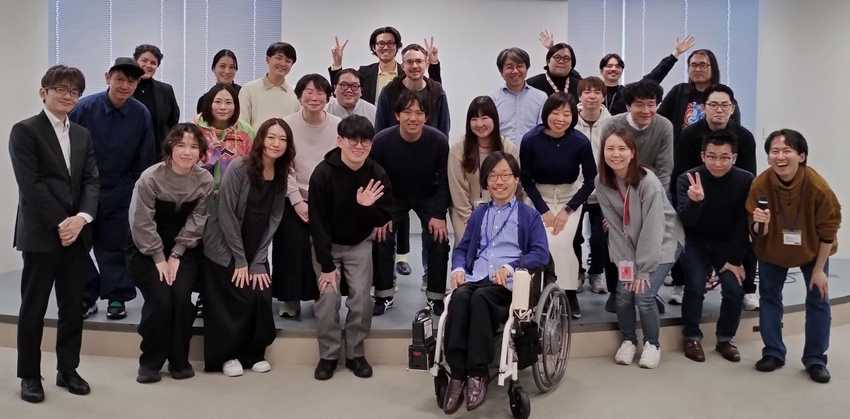 At the internal ELSI training session, “How to turn crazy ideas into reality”
At the internal ELSI training session, “How to turn crazy ideas into reality”
2. Value Exchange Engineering
For as long as humans have existed, we have exchanged value with one another—this began in the form of bartering and continues today in many forms. In recent years, new forms of value exchange and credit have emerged with the rapid development of technologies such as AI and blockchain. Unconstrained by the bounds of existing academic frameworks, we conduct research on wide-ranging technologies surrounding value exchange, with the aim of achieving a society in which people around the world can experience a fair and smooth exchange of value.
- See the details here: https://r4d.mercari.com/en/vxe/
2.1. Trial and error during the pandemic
The comprehensive agreement between R4D and RIISE to provide the Value Exchange Engineering collaborative course began in January 2020, so it was already underway when I joined R4D in April 2020. That said, it had only been a few months, so everyone was still working out where to get started, and no actual research had been done yet. It was also around that time that the COVID-19 pandemic began, so we were unable to have meetings in person, making it difficult to move ahead with the project.
With that in mind, the first thing I did was create opportunities for us to communicate and get to know each other. I started by holding one-on-one meetings with each of the professors at RIISE to get an idea of what they were interested in and worked with them to plan study sessions and workshops for Mercari. That way, we could compare and identify areas that both members of UTokyo and Mercari were interested in.
Like the rest of the world, we faced difficulties at the beginning of the pandemic, going through trial and error to figure out the best way to proceed with our work in a fully remote environment. For example, we planned a workshop that would gather all project participants in a large meeting room, and even visited the venue in advance to make sure it would fit our needs, but ended up canceling the workshop the day before after seeing news of a record-high number of COVID-19 cases in Tokyo. As we looked for alternatives, we turned to building relationships online. We held a half-day online event with a large number of participants, and despite having little experience with remote meetings, I was in charge of facilitation—a very nerve-racking experience. It was quite a trying time.
- Reference: R4D and The University of Tokyo Hold Online Event, “Let’s Think About Value Exchange Engineering!” #MercariDays (available in Japanese only)
2.2. Research matchmaking
Despite the rough times, we were able to start projects with many different research professors. For a time, I had near-daily meetings with Dr. Ari Hautasaari, who specializes in human-computer interaction (HCI) research, mainly in multilingual, intercultural, and remote communication. For example, for research on online communication and workstyles during the pandemic, we carried out interviews regarding the unique issues faced by Mercari as a company with employees who speak a variety of languages, as well as how Mercari addresses those issues. Related to those interviews, I also held many meetings to understand the interests and concerns of different employees, with teams such as the team in charge of internal language education, the team in charge of the office environment, the team in charge of DEI (diversity, equity, and inclusion), and the team in charge of developing apps for internal use.
I really love this kind of work, and I even called myself the “research matchmaker” at the time. Matchmaking is only the first step, and not all matches clearly hit it off right away. But communication between people can provide hints and inspiration, and even if those connections don’t immediately lead to something, they still become seeds that may grow into opportunities for collaboration later. My job was to plant those seeds wherever I could.
In the early stages of the Value Exchange Engineering course, I worked with Dr. Ari on his research, and on a separate occasion, I worked with @fujimiyu, a visiting researcher at R4D at the time. After we parted ways, Dr. Ari and @fujimiyu’s joint research flourished, and they even won several awards! Big congratulations to them! I’m really happy that I was able to play even a small part in their success.
- Reference: HCG Symposium 2023—Mercari R4D Researcher Miyuki Fujiwara Receives Best Interactive Presentation Award From Institute of Electronics, Information and Communication Engineers (IEICE)
- Reference: Research Conducted by R4D Researcher Miyuki Fujiwara and Value Exchange Engineering Members Rintaro Chujo and Ari Hautasaari of the University of Tokyo Receives MVE Award From the Institute of Electronics, Information and Communication Engineers
- Reference: Research Conducted by R4D Researcher Miyuki Fujiwara and Value Exchange Engineering Members Rintaro Chujo and Ari Hautasaari of the University of Tokyo Receives Interactive Presentation Award at INTERACTION 2025
I also worked with Dr. Teruaki Hayashi to plan study sessions and workshops on data integration applications. It was an interesting opportunity to think about what kind of value could be gained by combining the types of data held by Mercari Group and the types of data out there in society, as well as what kind of research topics could be studied in this area. The researchers working on the Value Exchange Engineering project include not only university professors, but many students as well; through these workshops, I worked with graduate students to help them explore hints and approaches for their research topics.
I was also somewhat involved in the launch phase of life cycle assessment (LCA) research. Mercari aims to contribute to creating a circular economy, but at the time, we hadn’t been able to quantify the impact of our services on avoiding CO2 emissions. So we thought, how about researching this as part of the Value Exchange Engineering course? Back then, I didn’t have any connections with professors who had expertise in LCA, so I dug through UTokyo’s website in search of professors who might be willing to help. I found Dr. Kurisu Kiyo’s page and reached out to her with the help of Dr. Yoshihiro Kawahara, the representative of the Value Exchange Engineering course at UTokyo. She introduced me to Dr. Dami Moon (@moon), and we began research on the consumer value of secondhand items. Once the research actually started, @yamachan, who was an R4D researcher at the time and is now a research PM, was in charge of providing data for use in the research, holding discussions, collaborating with Mercari’s Sustainability Team, and other steps. Later, we were lucky to have @moon join R4D as a researcher. Now, we’ve expanded the number of secondhand item categories used in our calculation of contribution to avoided emissions, and taken initiative to leverage this work further by volunteering to take part in a project to standardize metrics for CO2 emissions avoided by consumer behavior (the Positive Action Initiative, a project under the Decokatsu initiative). On top of this, @moon has made other outstanding achievements, such as collaborating with the Public Policy Team to participate in a Yakult project on empowerment of local governments through effective utilization of reused items, which was selected by J4CE as a noteworthy case for 2024.
Through the Value Exchange Engineering project, I connected many researchers with members of various teams at Mercari as a research matchmaker. I believe I was able to not only use my own curiosity, but probe into other people’s curiosity and expand it through our discussions to find the “sweet spot” where multiple people’s curiosity overlapped, forming collaborative projects as a result.
I also gained experience providing appropriate Mercari data to UTokyo researchers and having them manage and store it appropriately, as well as carrying out interviews in an appropriate way. None of these actions had any precedent within the company before, so we spent a lot of time establishing methodology for how best to do them. In doing so, we received help from many teams within the company, like the Privacy Team, the Security Team, the Risk Team, and the Legal Team. We also presented a large number of agenda items to the R&D Ethics Review Committee. I did everything I could behind the scenes to ensure that these processes went smoothly.
It’s all part of the job of “the person who connects the research.” I think (I hope) I was able to gain the trust of researchers bit by bit through my approach to these steady efforts.
Additionally, we’ve recently started setting up opportunities for casual discussions regarding ELSI and various research topics between Value Exchange Engineering researchers at UTokyo, researchers at Osaka University’s ELSI Center, and R4D. I see potential in R4D as a network hub, creating chances for many researchers and research topics to overlap and interact.
3. Establishing and Operating an Advisory Board for Research and Development
Unlike ELSI and Value Exchange Engineering, which are projects involving collaborative research between industry and academia, the goal of establishing and operating an advisory board for research and development is to manage the overall operations of R4D. The advisory board for research and development is a committee made up of Mercari members and external experts, and is in charge of conducting research and development-related reviews.
I have worked on creating, updating, and running a research evaluation system centered around this advisory board. Over the past five years, more researchers have joined R4D, and we deal with a much larger number of research topics, so we have continually updated our role and mission. We are evolving every day. To keep up with this progress, our research evaluation system needs to be constantly reworked.
On the management side, I have supported each of our researchers in bringing new ideas to the advisory board and discussing yearly audits and closure reports, ensuring that this is a smooth process. To me, this is the most interesting part of the job—I get to ask the researchers all sorts of questions and listen to stories about what they are working on. I support the researchers in creating research plans and presentation materials for preliminary audits and official board audits by talking with them about how best to explain their research topic. I also facilitate meetings for pre-audits, which are audits that occur before the official board audit, and work with researchers and the R4D manager on how to present their research before the meeting.
- Reference: mercari R4D Establishes Research and Development Advisory Board—Jun Murai, Keisuke Kawahara, and Woo-Keun Yoon Appointed as Board Members (available in Japanese only)
3.1. Behind the scenes of R4D’s research activities
One difficulty in creating the research evaluation system was setting evaluation metrics. I reworded the definitions of the metrics over and over again, and had to change them again when we actually started using them. But, no matter how these metrics were defined, it was impossible to evaluate all of R4D’s diverse research projects with a single set of metrics as they all had different timespans and dealt with different topics. We are still in the trial-and-error phase to optimize this. I expect that we will keep changing things as we go along.
This research evaluation system is important and impactful as a way for everyone to share opinions and ideas. R4D researchers can gain insight into their research projects based on the research evaluation system, and the board members discussing the research tailor their discourse to the system. The research evaluation system also needs to take into account the ideal state of R4D and is something that needs to be constantly reviewed, with the points of discussion always being diverse and extensive.
In addition to maintaining the policies of the research evaluation system, running the advisory board for research and development is also an extremely important part of my job. I have to plan the agenda a few months in advance, communicate with the board members, manage deadlines and submissions, and manage the security and translation of a variety of documents, all while making sure I don’t make any mistakes. Then, after the meeting has been held, I compile the extensive meeting minutes, consolidate comments from the board members, summarize talking points, write a draft to submit to the office for approval, and collect opinions about what we should change for next time. Before I know it, I have to start preparing for the next meeting; it’s relentless!
We generally hold hybrid advisory board meetings, with participants joining from both online and offline. Because the meeting is held in person, preparing the venue for use on the day is also a challenge—in the past, some audio equipment failed right before we needed it and we had to rush out and buy new things. We even prepared nice desserts to lift the mood. Since that time, we also started putting more thought into how to arrange the tables in the event space. After consulting with @afroscript and other members who are in charge of outreach at R4D, we rearranged the layout a few times and found that, instead of putting square tables in a formal U-shape, arranging round tables in a more relaxed manner creates a cafe-like atmosphere that facilitates discussion.
Reflecting on the last 5 years…
In this article, I introduced the work I’ve done around ELSI, Value Exchange Engineering, and the advisory board for research and development. In addition to these projects, I have also been involved in the Working Adult Doctoral Support System, providing support for prospective students (admission consultations, refining proposals, daily support for system users), and have helped out with various other large and small collaborative research between industry and academia.
- Reference: Rediscover the Joy of Being a Beginner at Graduate School—the Mercari R4D Team at Mercari, Inc. Will Support Your Academic Goals (available in Japanese only)
- Reference: Why Working Adults Hide Their Studying—The Barriers to Relearning Seen in Graduate School, and Companies That Support Further Study #ToYouWhoWork (available in Japanese only)
Looking back on my role as “the person who connects the research” over the past five years, I have acted as “matchmaker,” policy maker, and taken on any kind of role that helps promote research. Having worked on a number of research projects between industry and academia, I can say that the one commonality between them all is that every single project involved this kind of consistent, hard work.
Looking back has made me realize that what makes me passionate about this job is a long-standing academic curiosity that began when I was a student. The excitement of encountering unknown fields drives me to try and understand the interests and curiosities of each researcher, discover how different members at Mercari can come together, and work on research together. I feel that my role as “the person who connects the research” fits me perfectly, and I am grateful to work here.
Lately, I’ve been thinking of my job in terms of the following phrase: “A job that expands and builds upon the curiosity of others, while contributing to individual curiosity.” In other words, the process of collaborating between industry and academia involves reaching out to researchers and becoming involved in what they are curious about, while at the same time playing a role in R4D projects and keeping a steady hand on the wheel as we work together. Starting with my own curiosity, I aim to inspire researchers, practitioners, and all others involved to expand their curiosity a little further. Through this, I hope to find that sweet spot where one’s curiosity matches another’s, creating opportunities to foster connections. This is what “connecting the research” means to me.
Continued in “Part 2: A Conversation”
I spoke about this topic at the following universities.
- Osaka University, June 29, 2021: http://stips.jp/20210629/ (available in Japanese only)
- Hiroshima University, March 17–18, 2025: https://huccs.hiroshima-u.ac.jp/en/news/news-163/ (available in Japanese only)


